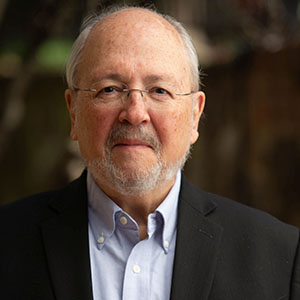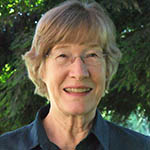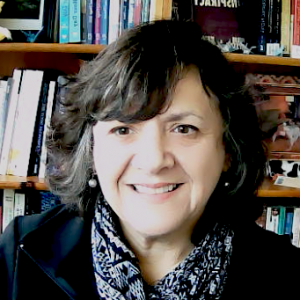 HDFS Alum Rona Karasik (MA, ’89), Professor at St. Cloud State University, is the recipient of the Hiram J. Friedsam Mentorship Award, which recognizes individuals who have contributed to gerontological and/or geriatrics education through excellence in mentorship to students, faculty, and administrators.
HDFS Alum Rona Karasik (MA, ’89), Professor at St. Cloud State University, is the recipient of the Hiram J. Friedsam Mentorship Award, which recognizes individuals who have contributed to gerontological and/or geriatrics education through excellence in mentorship to students, faculty, and administrators.
Author: Janice Berriault
Charles Super and Sara Harkness awarded APA Division 52 Award
Diondra Brown, HDFS Alumni Spotlight, June 2022
 Diondra Brown graduated with a bachelor’s degree in Human Development and Family Studies and Psychology in 2015. She desired to merge her academic areas of interest and pursued a master’s degree in Clinical Social Work at the University of Pennsylvania. While there, she studied evidenced-based therapy for children and families, in addition to conducting child-welfare policy research. During her time in graduate school, Diondra expanded her knowledge about family dynamics, trauma-informed treatment, and child development. Her field placements provided her with a wealth of experiences as she had opportunities to work in an early childhood learning academy, infant and child laboratory, residential treatment program, and outpatient mental health center.
Diondra Brown graduated with a bachelor’s degree in Human Development and Family Studies and Psychology in 2015. She desired to merge her academic areas of interest and pursued a master’s degree in Clinical Social Work at the University of Pennsylvania. While there, she studied evidenced-based therapy for children and families, in addition to conducting child-welfare policy research. During her time in graduate school, Diondra expanded her knowledge about family dynamics, trauma-informed treatment, and child development. Her field placements provided her with a wealth of experiences as she had opportunities to work in an early childhood learning academy, infant and child laboratory, residential treatment program, and outpatient mental health center.
Upon graduating from the University of Pennsylvania in 2017, Diondra worked as a child and family psychotherapist for several years with the University of Pennsylvania Health System. Her clinical work focused on play therapy, trauma therapy, and family therapy. Her clients’ diagnoses ranged from anxiety to attachment disorder. In addition to her clinical work, she pioneered the creation of a therapeutic preschool for 3- to 5-year-old children with a diagnosis of autism spectrum disorder or early childhood trauma and co-facilitated a maternal stress group for mothers and their infants. Given her passion for learning, Diondra mentored several graduate students during her time as a therapist and served as an adjunct professor at Thomas Jefferson University in 2020.
During the same year, she began to transfer her knowledge and skills into the world of children’s media, by serving as a consultant for global children’s media companies. She also took on a part-time role with Common Sense Media, as a Diversity, Equity, and Inclusion reviewer for children’s picture books and television shows. She is currently the Child Development & Education Manager at Twin Cities PBS. She leads content creation and curriculum development for the station’s newest Ready to Learn grant project, which aims to enhance executive functioning skills and career readiness for children in kindergarten through second grade. In her spare time, she volunteers as an officer for the Children’s Media Association. Diondra believes that her academic pursuits at UConn provided her with the foundation she needed for future success, and the ability to pursue various career pathways.
Mackenzie Wink, HDFS Graduate Student Spotlight, June 2022
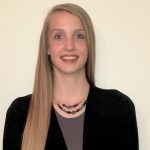 Mackenzie Wink is a PhD candidate who joined the HDFS department in 2017 to work with Dr. Maria LaRusso. She earned her BS in Psychology from the University of Wisconsin-Green Bay in 2016 and MA in HDFS from UConn in 2019. Mackenzie’s research interests largely focus on supporting the well-being of students and teachers in schools, primarily through Social Emotional Learning programs focused on building skills in awareness of the emotional experiences of oneself and others, relationship building, and self-regulation.
Mackenzie Wink is a PhD candidate who joined the HDFS department in 2017 to work with Dr. Maria LaRusso. She earned her BS in Psychology from the University of Wisconsin-Green Bay in 2016 and MA in HDFS from UConn in 2019. Mackenzie’s research interests largely focus on supporting the well-being of students and teachers in schools, primarily through Social Emotional Learning programs focused on building skills in awareness of the emotional experiences of oneself and others, relationship building, and self-regulation.
Mackenzie recently successfully defended her dissertation, which examined teachers’ social-emotional experiences in the classroom, such as their levels of compassion toward themselves, empathy toward their students, and experiences with job stress, to understand how these characteristics might impact their approaches toward behavior management. Findings illustrated that teachers’ well-being and empathy toward their students play an important role in their decisions for behavior management and interactions with the students in their classroom. Mackenzie hopes to continue this work within Social Emotional Learning interventions to shift from only teaching these skills to students, into a more a systematic approach for building social-emotional skills for everyone at school, including teachers and staff. Mackenzie also completed the graduate certificate in program evaluation and hopes to utilize those skills in this future work.
In addition to research, Mackenzie has had the privilege to independently teach or work as a teaching assistant for a number of undergraduate courses, including Research Methods, Infancy through Adolescence, Professional Communication, and Social and Community Influence on Children in the United States. Mackenzie also received recognition for excellence in teaching by the Center for Excellence in Teaching and Learning in 2021.
Mackenzie accepted a Postdoctoral Fellowship position with the Child Health and Development Institute to start over the summer. She is looking forward to continue toward supporting children’s mental health and social-emotional well-being through school-based programming in Connecticut!
Meg Galante-DeAngeles, HDFS Faculty Spotlight, June 2022
Lecturer
 Meg Galante-DeAngelis retired June 1, 2022 after 49 years as a member of the UConn community. From her first step onto campus to retirement, the University offered Meg the opportunity to follow the most elusive and wonderful of all dreams – to make a difference in the lives of others. Learning together with her students as they developed their passion for supporting each child to flourish as an individual has been a life’s work worth having. The question she often asks is, “What if everybody understood child development?”
Meg Galante-DeAngelis retired June 1, 2022 after 49 years as a member of the UConn community. From her first step onto campus to retirement, the University offered Meg the opportunity to follow the most elusive and wonderful of all dreams – to make a difference in the lives of others. Learning together with her students as they developed their passion for supporting each child to flourish as an individual has been a life’s work worth having. The question she often asks is, “What if everybody understood child development?”
Always more comfortable being a worker bee rather than the queen, Meg has tried to be the best member of the HDFS community that she could be. Her gratitude to her colleagues and students, past and present, is immeasurable. Her special thanks to the teachers and administrators, past and present, at the UConn Child Development Labs are twofold. She will be sustained by the wonder of days spent at the Child Labs in the company of children and will cherish the life-lasting gift of being seen and loved as individuals still enjoyed by her five children, all proud graduates of the Child Development Labs. Would that every child had this opportunity.
During her time at UConn, Meg was involved with the Child Labs in many ways – as undergraduate and graduate student, observer, learner and worker, in Infant/Toddler and Preschool Master Teacher positions, as Assistant Director/Program Coordinator, and as Faculty Advisor. Two of her proudest memories are working with Charlotte Madison to get the teachers at the Child Labs unionized and to design the CDL Infant Center. Meg has loved working with the other Early Childhood faculty who share her commitment to children. She is particularly interested in teacher preparation, advocacy for equity and social justice, quality care and education for infants and toddlers, and supporting first generation college students. She has taught every UConn Early Childhood Development and Education course. She and her colleagues help students develop active engagement in daily reflection and mindfulness that support best practice while recognizing self-care practices. Meg was recently recognized for her excellence by two awards: the HDFS Faculty Teaching Award and the UConn-AAUP – Career Teaching Excellence Award.
Meg’s career afforded her the opportunity to be around the amazing young people who choose Human Development and Family Sciences as their major. One of her favorite stories is about a student who, on an interview, was told, “You are like a unicorn. I did not know that people with the kind of early childhood training you have existed in the real world.” Well, they do exist and they are out there making a difference in the lives of children and families every day.
In retirement, Meg plans to enjoy beauty and quiet on an island off the coast of Maine punctuated by visits from her gregarious and growing family. She looks forward to volunteering in her local community, hiking, doing genealogical and historical research, and perfecting 18th and 19th century cooking and other period crafting techniques.
Sydney Klein receives SASP 2022 Recognition of Excellence Award
 Congratulations to graduate student Sydney Klein, winner of the Student Athlete Success Program (SASP) 2022 Recognition of Excellence Award for going above and beyond in her role as SASP Mentor. She was nominated for the award by student athletes and SASP staff.
Congratulations to graduate student Sydney Klein, winner of the Student Athlete Success Program (SASP) 2022 Recognition of Excellence Award for going above and beyond in her role as SASP Mentor. She was nominated for the award by student athletes and SASP staff.
Laura Donorfio receives 2022 Clark Tibbitts Award
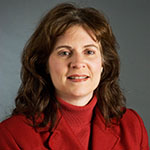 Congratulations to Associate Professor Laura Donorfio, winner of the 2022 Clark Tibbitts Award from the Gerontological Society of America (GSA) and the Academy for Gerontology in Higher Education (AGHE). This award is given to an individual or organization that has made an outstanding contribution to the advancement of gerontology and/or geriatrics education.
Congratulations to Associate Professor Laura Donorfio, winner of the 2022 Clark Tibbitts Award from the Gerontological Society of America (GSA) and the Academy for Gerontology in Higher Education (AGHE). This award is given to an individual or organization that has made an outstanding contribution to the advancement of gerontology and/or geriatrics education.
Abagail Horton receives APA Division 43 Student Travel Award
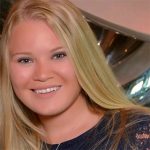 HDFS graduate student Abbey Horton received an APA Division 43 Student Travel Award due to her highly rated abstract to help offset the costs of attending the APA conference this August.
HDFS graduate student Abbey Horton received an APA Division 43 Student Travel Award due to her highly rated abstract to help offset the costs of attending the APA conference this August.
Lisa Eaton receives CLAS 2022 Strategic Goal Award
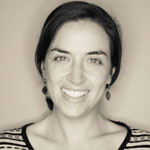 Congratulations to Professor Lisa Eaton, winner of the CLAS 2022 Strategic Goal Award for Innovative Scholarship!
Congratulations to Professor Lisa Eaton, winner of the CLAS 2022 Strategic Goal Award for Innovative Scholarship!
Rui Wu awarded UConn 2022 summer fellowship
 Congratulations to graduate student Rui Wu, who was awarded a UConn 2022 Wood/Raith Gender Identity Living Trust summer fellowship!
Congratulations to graduate student Rui Wu, who was awarded a UConn 2022 Wood/Raith Gender Identity Living Trust summer fellowship!
